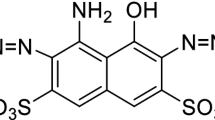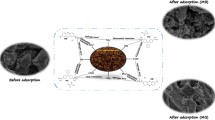Abstract
Natural dyes exhibit a low dye uptake when cellulosic fiber dyeing is carried out using a conventional water bath dyeing process. In this research, cotton fabric was exhaust dyed in a microemulsion dyebath containing cacao husk extracts dye and decamethylcyclopentasiloxane (D5) to achieve higher dye exhaustion percentage on cotton fiber, which is an environmentally beneficial dyeing process. The adsorption behavior of cacao husk extract dye in a D5 microemulsion system was investigated under conditions of varied dye mass (1–8% o.w.f), dyeing time (5–500 min), and dyeing temperatures (333–373 K). Kinetic modelling of cacao husk extracts dye/D5 adsorption on cotton fiber was studied by fitting experimental data to pseudo first-order and pseudo second-order kinetics, and the intraparticle diffusion model. Early results indicated that the kinetic model of adsorption of cacao husk extracts dye on cotton fiber followed the pseudo second-order model. Langmuir, Freundlich, and Dubinin–Radushkevich adsorption isotherm models were employed to analyze the adsorption isotherms, and the results showed that the adsorption process fit well with the Langmuir model compared to the Freundlich isotherm. The mean adsorption energy from the Dubinin–Radushkevich isotherm model implied that adsorption of the cacao husk extracts onto cotton was accompanied with a physical process. The values of standard enthalpy (ΔH° > 0), standard entropy (ΔS° > 0), and Gibbs free energy (ΔG° < 0) strongly reflected that the adsorption of the cacao husk extracts onto cotton was thermodynamically favourable and feasible. Thus, waterless dyeing of cotton fabric using a natural dye/D5 system explores a sustainable dyeing technology with higher dye exhaustion percentage.
Graphic abstract









Similar content being viewed by others
Availability of data and material
The datasets generated during the current study are available from the corresponding author on reasonable request (Prof. Yingjie Cai).
Code availability
No code was attempted or used during the current manuscript.
References
Abraham R, Mathew S, Kurian S, Saravanakumar M, Ealias AM, George G (2018) Facile synthesis, growth process, characterisation of a nanourchin-structured α-MnO2 and their application on ultrasonic-assisted adsorptive removal of cationic dyes: A half-life and half-capacity concentration approach. Ultrason Sonochem 49:175–189. https://doi.org/10.1016/j.ultsonch.2018.07.045
Abraham R, Mathew S, Kurian S, Saravanakumar M, Ealias AM, George G (2018) Facile synthesis, growth process, characterisation of a nanourchin-structured α-MnO2 and their application on ultrasonic-assisted adsorptive removal of cationic dyes: a half-life and half-capacity concentration approach. Ultrason Sonochem 49:175–189. https://doi.org/10.1016/j.ultsonch.2018.07.045
Alkan M, Demirbaş Ö, Doğan M (2007) Adsorption kinetics and thermodynamics of an anionic dye onto sepiolite. Micropor Mesopor Mat 101:388–396. https://doi.org/10.1016/j.micromeso.2006.12.007
Cai Y, Huang Y, Liu F, He L, Lin L, Zeng Q (2014) Liquid ammonia dyeing of cationic ramie yarn with triazinyl reactive dyes. Cellulose 21:3841–3849. https://doi.org/10.1007/s10570-014-0393-1
Cai Y, Liang Y, Navik R, Zhu W, Zhang C, Pervez MN, Wang Q (2020) Improved reactive dye fixation on ramie fiber in liquid ammonia and optimization of fixation parameters using the Taguchi approach. Dyes Pigments 183:108734. https://doi.org/10.1016/j.dyepig.2020.108734
Cai Y, Su S, Navik R, Wen S, Peng X, Pervez MN, Lin L (2018) Cationic modification of ramie fibers in liquid ammonia. Cellulose 25:4463–4475. https://doi.org/10.1007/s10570-018-1905-1
Chairat M, Rattanaphani S, Bremner JB, Rattanaphani V (2005) An adsorption and kinetic study of lac dyeing on silk. Dyes Pigments 64:231–241. https://doi.org/10.1016/j.dyepig.2004.06.009
Chanzu HA, Onyari JM, Shiundu PM (2019) Brewers’ spent grain in adsorption of aqueous Congo Red and malachite Green dyes: Batch and continuous flow systems. J Hazard Mater 380:120897. https://doi.org/10.1016/j.jhazmat.2019.120897
Chen L, Wang B, Ruan X, Chen J, Yang Y (2015) Hydrolysis-free and fully recyclable reactive dyeing of cotton in green, non-nucleophilic solvents for a sustainable textile industry. J Clean Prod 107:550–556. https://doi.org/10.1016/j.jclepro.2015.05.144
Ferus-Comelo M (2013) An analysis of the substantivity of hydrolysed reactive dyes and its implication for rinsing processes. Color Technol 129:24–31. https://doi.org/10.1111/j.1478-4408.2012.00405.x
Gorjanc M, Savić A, Topalić-Trivunović L, Mozetič M, Vesel A, Grujić D (2016) Dyeing of plasma treated cotton and bamboo rayon with Fallopia japonica extract. Cellulose 23:2221–2228. https://doi.org/10.1007/s10570-016-0951-9
Halysh V, Sevastyanova O, Riazanova AV, Pasalskiy B, Budnyak T, Lindström ME, Кartel M (2018) Walnut shells as a potential low-cost lignocellulosic sorbent for dyes and metal ions . Cellulose 25:4729–4742. https://doi.org/10.1007/s10570-018-1896-y
Hameed BH, Salman JM, Ahmad AL (2009) Adsorption isotherm and kinetic modeling of 2,4-D pesticide on activated carbon derived from date stones. J Hazard Mater 163:121–126. https://doi.org/10.1016/j.jhazmat.2008.06.069
Haque ANM, Remadevi R, Rojas OJ, Wang X, Naebe M (2020) Kinetics and equilibrium adsorption of methylene blue onto cotton gin trash bioadsorbents . Cellulose 27:6485–6504. https://doi.org/10.1007/s10570-020-03238-y
Hong KH, Bae JH, Jin SR, Yang JS (2012) Preparation and properties of multi-functionalized cotton fabrics treated by extracts of gromwell and gallnut. Cellulose 19:507–515. https://doi.org/10.1007/s10570-011-9613-0
Hoque MIU et al (2019) A facile synthesis of hematite nanorods from rice starch and their application to Pb (II) ions removal . ChemistrySelect 4:3730–3736. https://doi.org/10.1002/slct.201802462
Hossain MY, Liang Y, Pervez MN, Ye X, Dong X, Hassan MM, Cai Y (2020) Effluent-free deep dyeing of cotton fabric with cacao husk extracts using the Taguchi optimization method. Cellulose . https://doi.org/10.1007/s10570-020-03525-8
Inyinbor A, Adekola F, Olatunji GA (2016) Kinetics, isotherms and thermodynamic modeling of liquid phase adsorption of Rhodamine B dye onto Raphia hookerie fruit epicarp Water Resour Ind 15:14-27 https://doi.org/10.1016/j.wri.2016.06.001
Islam MA, Ali I, Karim SA, Firoz MSH, Chowdhury A-N, Morton DW, Angove MJ (2019) Removal of dye from polluted water using novel nano manganese oxide-based materials. J Water Process Eng 32:100911. https://doi.org/10.1016/j.jwpe.2019.100911
Islam M, Mishra PC, Patel R (2010) Physicochemical characterization of hydroxyapatite and its application towards removal of nitrate from water. J Environ Manage 91:1883–1891. https://doi.org/10.1016/j.jenvman.2010.04.013
Islam MA, Morton DW, Johnson BB, Mainali B, Angove MJ (2018) Manganese oxides and their application to metal ion and contaminant removal from wastewater. J Water Process Eng 26:264–280. https://doi.org/10.1016/j.jwpe.2018.10.018
İşmal ÖE, Yıldırım L (2019) 3 - Metal mordants and biomordants. In: Shahid ul I, Butola BS (eds) The Impact and Prospects of Green Chemistry for Textile Technology. Woodhead Publishing, Cambridge, pp 57–82. https://doi.org/10.1016/B978-0-08-102491-1.00003-4
Khandaker S, Toyohara Y, Saha GC, Awual MR, Kuba T (2020) Development of synthetic zeolites from bio-slag for cesium adsorption: kinetic, isotherm and thermodynamic studies. J Water Process Eng 33:101055. https://doi.org/10.1016/j.jwpe.2019.101055
Li Y et al (2012) Equilibrium, kinetic and thermodynamic studies on the adsorption of phenol onto graphene. Mater Res Bull 47:1898–1904. https://doi.org/10.1016/j.materresbull.2012.04.021
Liman MLR, Islam MT, Hossain MM, Sarker P, Dabnath S (2020) Coloration of cotton fabric using watermelon extract: mechanism of dye-fiber bonding and chromophore absorption J Text Inst. https://doi.org/10.1080/00405000.2020.1738036
Malash GF, El-Khaiary MI (2010) Piecewise linear regression: a statistical method for the analysis of experimental adsorption data by the intraparticle-diffusion models. Chem Eng J 163:256–263. https://doi.org/10.1016/j.cej.2010.07.059
Morshed MN, Pervez MN, Behary N, Bouazizi N, Guan J, Nierstrasz VA (2020) Statistical modeling and optimization of heterogeneous Fenton-like removal of organic pollutant using fibrous catalysts: a full factorial design. Sci Rep 10:1–14. https://doi.org/10.1038/s41598-020-72401-z
Moussout H, Ahlafi H, Aazza M, Maghat H (2018) Critical of linear and nonlinear equations of pseudo-first order and pseudo-second order kinetic models Karbala. Int J Mod Sci 4:244–254. https://doi.org/10.1016/j.kijoms.2018.04.001
Nandi BK, Goswami A, Purkait MK (2009) Adsorption characteristics of brilliant green dye on kaolin. J Hazard Mater 161:387–395. https://doi.org/10.1016/j.jhazmat.2008.03.110
Nesic AR, Velickovic SJ, Antonovic DG (2012) Characterization of chitosan/montmorillonite membranes as adsorbents for Bezactiv Orange V-3R dye. J Hazard Mater 209:256–263. https://doi.org/10.1016/j.jhazmat.2012.01.020
Noroozi B, Sorial G, Bahrami H, Arami M (2007) Equilibrium and kinetic adsorption study of a cationic dye by a natural adsorbent—Silkworm pupa. J Hazard Mater 139:167–174. https://doi.org/10.1016/j.jhazmat.2006.06.021
Pei L, Luo Y, Gu X, Dou H, Wang J (2019) Diffusion mechanism of aqueous solutions and swelling of cellulosic fibers in silicone non-aqueous dyeing system. Polymers 11:411. https://doi.org/10.3390/polym11030411
Perez-Ameneiro M, Vecino X, Cruz J, Moldes A (2015) Wastewater treatment enhancement by applying a lipopeptide biosurfactant to a lignocellulosic biocomposite. Carbohydr Polym 131:186–196. https://doi.org/10.1016/j.carbpol.2015.05.075
Pervez M, He W, Zarra T, Naddeo V, Zhao Y (2020) New sustainable approach for the production of Fe3O4/graphene oxide-activated persulfate system for dye removal in real wastewater . Water 12:733. https://doi.org/10.3390/w12030733
Pervez MN, Stylios GK, Liang Y, Ouyang F, Cai Y (2020) Low-temperature synthesis of novel polyvinylalcohol (PVA) nanofibrous membranes for catalytic dye degradation. J Clean Prod. https://doi.org/10.1016/j.jclepro.2020.121301
Rehman A et al (2018) Simultaneous dyeing and anti-bacterial finishing on 100% cotton fabric: process establishment and characterization. Cellulose 25:5405–5414. https://doi.org/10.1007/s10570-018-1934-9
Risner CH (2008) Simultaneous determination of theobromine,(+)-catechin, caffeine, and (–)-epicatechin in standard reference material baking chocolate 2384, cocoa, cocoa beans, and cocoa butter. J Chromatogr Sci 46:892–899. https://doi.org/10.1093/chromsci/46.10.892
Roy A, Adhikari B, Majumder S (2013) Equilibrium, kinetic, and thermodynamic studies of azo dye adsorption from aqueous solution by chemically modified lignocellulosic jute fiber. Ind Eng Chem Res 52:6502–6512. https://doi.org/10.1021/ie400236s
Salager J-L, Forgiarini AM, Márquez L, Manchego L, Bullón J (2013) How to attain an ultralow interfacial tension and a three-phase behavior with a surfactant formulation for enhanced oil recovery: a review. Part 2. Performance improvement trends from winsor’s premise to currently proposed inter- and intra-molecular mixtures. J Surfactants Deterg 16:631–663. https://doi.org/10.1007/s11743-013-1485-x
Samanta AK, Konar A (2011) Dyeing of textiles with natural dyes. Natural dyes. InTech, Rijeka. https://doi.org/10.5772/21341
Simonin J-P (2016) On the comparison of pseudo-first order and pseudo-second order rate laws in the modeling of adsorption kinetics. Chem Eng J 300:254–263. https://doi.org/10.1016/j.cej.2016.04.079
Srivastav AL, Singh PK, Srivastava V, Sharma YC (2013) Application of a new adsorbent for fluoride removal from aqueous solutions. J Hazard Mater 263:342–352. https://doi.org/10.1016/j.jhazmat.2013.04.017
Su S et al (2019) Anhydrous dyeing processes of ramie fiber in liquid ammonia. Cellulose 26:8109–8120. https://doi.org/10.1007/s10570-019-02630-7
Tan I, Ahmad A, Hameed B (2008) Adsorption of basic dye on high-surface-area activated carbon prepared from coconut husk: equilibrium, kinetic and thermodynamic studies. J Hazard Mater 154:337–346. https://doi.org/10.1016/j.jhazmat.2007.10.031
Tang S et al (2019) Dye adsorption by self-recoverable, adjustable amphiphilic graphene aerogel. J Colloid Interf Sci 554:682–691. https://doi.org/10.1016/j.jcis.2019.07.041
Tang AY, Kan C (2020) Non-aqueous dyeing of cotton fibre with reactive dyes: a review . Color Technol . https://doi.org/10.1111/cote.12459
Tang AY, Wang YM, Lee CH, Kan C-W (2017) Computer color matching and levelness of PEG-based reverse micellar decamethyl cyclopentasiloxane (D5) solvent-assisted reactive dyeing on cotton fiber. Appl Sci 7:682. https://doi.org/10.3390/app7070682
Tanzifi M et al. (2018) Adsorption of Amido Black 10B from aqueous solution using polyaniline/SiO2 nanocomposite: Experimental investigation and artificial neural network modeling J Colloid Interf Sci 510:246–261 https://doi.org/10.1016/j.jcis.2017.09.055
Tsatsaroni E, Liakopoulou-Kyriakides M (1995) Effect of enzymatic treatment on the dyeing of cotton and wool fibres with natural dyes. Dyes Pigments 29:203–209. https://doi.org/10.1016/0143-7208(95)00044-G
Wang J, Gao Y, Zhu L, Gu X, Dou H, Pei L (2018) Dyeing property and adsorption kinetics of reactive dyes for cotton textiles in salt-free non-aqueous. Dyeing Syst Polym 10:1030. https://doi.org/10.3390/polym10091030
Wang X, Jiang C, Hou B, Wang Y, Hao C, Wu J (2018) Carbon composite lignin-based adsorbents for the adsorption of dyes . Chemosphere 206:587–596. https://doi.org/10.1016/j.chemosphere.2018.04.183
Wang Y, Lee C-h, Tang Y-l, Kan C-w (2016) Dyeing cotton in alkane solvent using polyethylene glycol-based reverse micelle as reactive dye carrier . Cellulose 23:965–980. https://doi.org/10.1007/s10570-015-0831-8
Weber WJ, Morris JC (1940) Kinetics of adsorption on carbon from solution. J San Eng Div 89:31–60
Funding
This work was financially supported by the China National Textile & Apparel Council (2013“Textile Vision” Applied Basic Research, 2013 − 153), and Hubei Province Science and Technology Support Program (Grant No. 2013BAA043).
Author information
Authors and Affiliations
Contributions
Conceptualization: YC, XY; Methodology: Md.YH, WZ, Md.NP; Formal analysis and investigation: Md.YH, WZ, Md.NP; Writing - original draft preparation: Md.YH, WZ, Md.NP, SS; Writing - review and editing: MMH, Md.IUlH, VN; Funding acquisition: YC, XY; Supervision: YC, XY.
Corresponding authors
Ethics declarations
Conflict of interest
The authors have no conflicts of interest to declare that are relevant to the content of this article.
Ethical approval
This manuscript does not contain any studies with human participants or animals performed by any of the authors.
Additional information
Publisher’s note
Springer Nature remains neutral with regard to jurisdictional claims in published maps and institutional affiliations.
Rights and permissions
About this article
Cite this article
Hossain, M.Y., Zhu, W., Pervez, M.N. et al. Adsorption, kinetics, and thermodynamic studies of cacao husk extracts in waterless sustainable dyeing of cotton fabric. Cellulose 28, 2521–2536 (2021). https://doi.org/10.1007/s10570-020-03662-0
Received:
Accepted:
Published:
Issue Date:
DOI: https://doi.org/10.1007/s10570-020-03662-0




